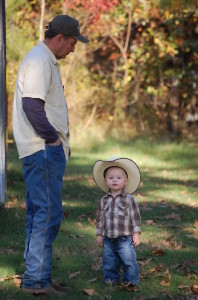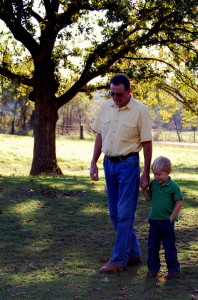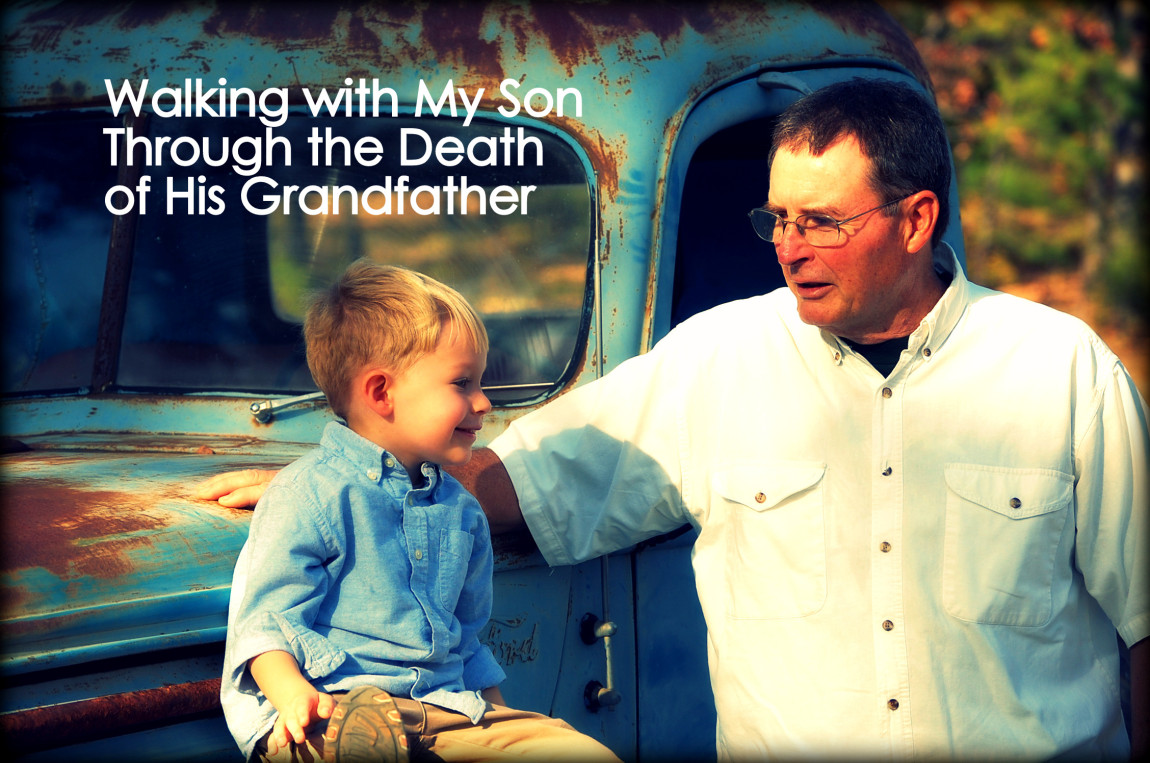Some of my favorite moments in fatherhood are the serious moments.
Sure I love the fun moments—the times of laughter, of play, of exuberant joy in which my children are inviting me to join them in their world. Yet it’s the moments in which life demands that I invite them into my world which I find the most meaningful. I enjoy navigating the deep things of life with my children (for an example, see How I Told My Son His Sister Has Down Syndrome).
Last week we experienced another one of those moments. If you have been following Jenny’s blog, you know her dad died 10 weeks after being diagnosed with an aggressive brain cancer (for more of the story click here). While my heart broke for my wife, I also knew my 5-year-old, Silas, would have a very difficult time with the death of his grandfather. Watching him process the events of this past week has been fascinating.
When my father-in-law was diagnosed at the end of July, we immediately told the kids. As I’ve written before, we don’t keep secrets in our house. While as parents we may not tell our children everything, we do keep them well-informed of what is happening even if the news is painful. By telling them of the diagnosis, it gave them time to process what would happen and allowed us to watch their processing in order to help them in whatever way possible.
On that first day, I sat Silas down and told him I had some very bad news. His grandfather was really sick. “What does he have,” Silas asked. Having lost my grandmother two years ago to cancer and since she had lived next door during that time, I told Silas, “It’s kind of what Mammaw had.” Silas immediately responded, “But Dad, Mammaw died.” “I know,” I said.
From that point on, Silas was trying to come to grips with what he had heard with his ears but what he saw with his eyes. Over those 10 weeks, he spent a lot of time at his grandfather’s house and while small things were noticeable, the general effects of the cancer were not evident to a 5-year-old.
While Silas was clearly processing everything, Ella was not. From the beginning, she was more fascinated with the word “tumor” than its actual effects. Whether or not she will ever have the cognitive or emotional ability to process death is unknown, but it was evident in this loss she wouldn’t need extra time and attention. I made sure she was well taken care of, but then turned a majority of my attention to Silas.
The Notification
Jenny’s Dad died mid-morning on a Wednesday. We received the call to come quickly but before I could even get home from work he was gone. Jenny’s parents live an hour away so as we made our way there, I made arrangements for the kids. My biggest concern—I didn’t want them to find out about the death before we could tell them. My mom picked them up from school, kept them home from church, and played the role of Nana until we got home.
When we arrived, we got them ready for bed and then gathered in the living room. I told them I had something serious to tell them and that it was very bad news. I expected to have to explain it, but as soon as I said, “Papa Bruce died today,” Silas lost it. With my first words—”Papa Bruce”—a small smile had started. How many times had I started a good sentence with the words “Papa Bruce?” He was probably expecting me to finish the line by saying: “wants you to spend the night,” or “wants to take you fishing,” or “wants you to go to Turkey Track.” Instead, I said “died today.”
The smile quickly turned to a face of total heartbreak. Sobbing, twisting, and flying fists, only gave way to the repeated line, “But he was my favorite person.” In the mind of a 5-year-old, favorite people don’t die. After several minutes of this cycle, Silas said a typical grief statement, “Why would you say something like that to me.”
My heart broke for him. For most of what pains my son, I can do something about it—hurt feelings or skinned knees can be mended. But there was nothing I could do for this. This was a pain he would have to bear and all I could do is love him through it.
After the tears subsided, we began our bedtime routine. Prayers were said as Silas tried to understand that his Papa was in heaven. Eventually, songs distracted his mind to sleep.
The House
 Two days after the death, Silas and I made our way to his grandparents house. I wanted him there as soon as possible, so he could see for himself that his grandfather wouldn’t be there.
Two days after the death, Silas and I made our way to his grandparents house. I wanted him there as soon as possible, so he could see for himself that his grandfather wouldn’t be there.
I pulled him out of school and took him to lunch. Over Happy Meals we talked about life and death, the difference between a body and a spirit, and what would take place the rest of the day. After lunch we made the drive.
The drive to Jenny’s parents house is a beautiful one. It requires a trip “over the mountain” which has such beauty and peace to it. Silas was very talkative until we began our descent down the mountain. We were getting close and he knew it. As we neared the driveway, I heard him take a deep breath and whisper to himself, “I can do this.” Strangely, I was saying the same thing to myself.
As we pulled in the long driveway, I reminded Silas that he would see his grandfather’s trucks, horses, and tractors, but his grandfather wouldn’t be there. He jumped out of the car and greeted his grandmother, but he didn’t want to go into the house.
I told him he didn’t have to and asked if he wanted me to stay outside as he played. He did, so I did. He dug up rocks, looked for frogs, and chased butterflies. I needed to go into the house for a moment and invited him to join me, but he didn’t want to go. There was no need to force it. He would go in when he was ready.
Finally he ran inside for a drink, but quickly asked me to go back outside. I went and slowly over the day he would come and go with more ease. He was bravely figuring out life at Papa Bruce’s house without Papa Bruce there.
The Body
The greatest debate I had with all the funeral arrangements was whether or not to have Silas view the body. He seemed too young, yet I’m not an expert in child psychology. Thankfully I know a few people who are. I asked their opinion and both said to take my cues from him but to encourage him to view.
We talked at length about what would happen and I asked what he wanted to do. He said he wanted to go, but not see. His decision seemed more based on not wanting to be away from me and Jenny than anything else.
As we arrived we didn’t immediately get out of the car. I told him, “We need a code word. We need a word that if you get scared or want to leave, you can say it and I’ll know. No one else will know, but I’ll know and we will leave.” We came up with the code word “Marco” and made our way in.
We walked in with no problem but as we came to the back of the chapel he could see some people and the casket. He quickly said “Marco” and I retreated. I asked if he wanted to go outside or if he wanted to sit on this “safe bench” in the hallway? “What’s a “safe bench” he asked. I told him it was a bench where he would be comfortable, would still be near me and his mother, but wouldn’t see anything in the chapel. It was a safe place he could go. He liked the safe bench so we stayed there.
A few minutes later he said he wanted to peek into the chapel. I agreed, so we made our way in. He placed his hand on my neck. Like a bit in a horse’s mouth, his hand could guide me where he wanted to go. When he pushed forward, I went forward. When he stopped, I stopped. When he said “Marco” we went back to the safe bench.
We peaked, then we went in, then we made it halfway down the aisle, then all the way down the aisle, then to the casket, and finally he reached a comfort level where I could put him and down and he could come and go as he pleased.
He didn’t like seeing his grandfather but he did like being where everyone was. Before the night was over, he was running around as he does at church—like he owned the place.
The Funeral
We gave Silas two options for the funeral—he could play with his cousins in the nursery or sit with my mom. He rejected both of them. In a minor fit of rebellion he refused to leave his mother’s side. I didn’t properly process the possibility that he might not do as I said. Not wanting to leave the pulpit and cause a scene, I let him be.
 It wasn’t a scenario for which I was prepared. I’ve performed a lot of funerals and have even done funerals in which my loved ones were in the casket and on the front row, but I hadn’t thought through trying to speak while my son wept a few feet away.
It wasn’t a scenario for which I was prepared. I’ve performed a lot of funerals and have even done funerals in which my loved ones were in the casket and on the front row, but I hadn’t thought through trying to speak while my son wept a few feet away.
He did well. He sat attentively. Watching his mom and grandmother cry didn’t seem to unnerve him. He cried as well.
As the service ended and I closed in prayer, Jenny bowed her head and wept. Silas took her Kleenex out of her hand and gently dabbed the tears from his mother’s face. It was a picture of life—weeping over the loss of one generation even as the potential of the next generation sits in your lap. It was also a shadow of the gospel for the Bible says a day will come in which Jesus will wipe away every tear.
The Aftermath
In the days since the funeral, life seems to have returned to normal for Silas. Even as the season of sadness hangs heavy for the family, he is doing well. I know tough days could be ahead. After the death of my grandparents, Silas had difficulty sleeping for months. At any moment, the stress he is experiencing could express itself.
Yet kids are very resilient. Not only do they recover quickly, they often are the great aide to our own recovery.
A few thoughts in response to what I have seen this past week:
Remember this is our story. This is not a how-to of handling grief. I’m sure we got some things right and some things wrong. Learn from it as you wish. Yet every child is different. Notice we didn’t handle our two children the same. Each situation and each child should be handled differently.
For the most part, our children are introduced to death far too late. We should change this. We should allow them to see and experience death. Pets live and die—they don’t suddenly run off and get married or take a trip. People live and die. With age appropriateness and tact, children can understand this far better than we realize. I’m convinced this process has been easier because of the openness with which Jenny and I talked to our children about the death of my grandparents over the past two years.
When in doubt, talk about it. It’s amazing what conversations we can have with our children if we will just talk to them. For me, these are the most important moments in parenting—not the things we can fix, but the things in which we can assist our children in understanding.
Don’t expect perfection from yourself or others. In retrospect, I wish we would’ve done some things differently, but we did our best. We didn’t navigate the waters of grief perfectly, but we navigated them well. Sometimes we feel we have to be great when being good is good enough.




16 Responses to Walking with My Son Through the Death of His Grandfather